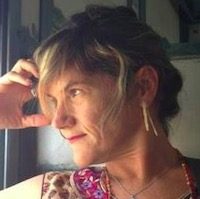
This is Part One of a two-part piece. This section raises some important questions about spirituality and faith; the other seeks to answer them. Read them both together for maximum benefit! ~ ed.
~
Three years ago, I was sitting in a window seat of an air-conditioned bus careening down the highways of south India, a Bollywood movie playing silently on the inconsistent screen above our driver.
As I watched the rolling fields fly by, wincing every time I looked up to see our bus just barely miss hitting a cow, or a rickshaw, or another bus, or an entire family riding—no helmets—on a motorcycle, with the mother seated side-saddle behind her husband, bright sari flowing in the wind behind her as she held her infant baby to her chest, I sought respite from the terrifying and barely controlled chaos that often defines road trips in India.
On this particular day—a bright, hot day, a long day of travel—respite came in the form of a headset and a podcast.
Settling into the corner provided by my window seat, checking first to make sure all the students were cared for and finding their own ways to manage the adventure, I tuned in to an interview with one of my heroes, Representative John Lewis.
This particular interview had a profound influence on my consciousness. It was a reconciling of faith and action—something I had been thinking about, teaching about, and grappling with for many years. I was moved not only by his direct impact and involvement in the civil rights movement, but by his unwavering integrity and his deep faith—the foundations on which he stood to effectively lead the cause with determination and resiliency.
Three years later, I found myself once again on a bus in India, once again feeling the powerful awakening that comes with being immersed in a culture where faith is at the center of seemingly everything, and where the individual, direct relationship with God is respected and encouraged. And once again, I was feeling unnerved.
This time though, the sensations of instability and anxiety came not from the hurtling bus, but from inside my own heart, as if it were its own bus, making its way through the complexities of spirituality and social justice.
I felt I was barely missing collisions with friends and colleagues, both close and peripheral, and was nearly derailed not by cows and families on motorcycles, but by the pressing rectitude of the current movement and its self-proclaimed arbiters of righteousness. I felt the pressure to agree upon and adhere to one right answer, one right way, in the pursuit of justice.
Despite having limited internet, I had peered through many online windows—none quite big enough for real engagement or personal connection; indeed, the internet is rarely the place for real engagement and personal connection—to witness the conflict: right versus wrong, this versus that. Through these windows, I could see the exclusionary rhetoric that seemed to be a hallmark of much of the social justice movement as it was being “revived” in response to the current political climate.
It was a glimpse through one of these windows that set me in the state of frustration and inner conflict, the state in which I boarded the bus that morning. At first, I just leaned my arms and head on the seat in front of me and wept.
Once I had allowed that physical response to move through, I sat back and closed my eyes. I leaned into the fabric of personal faith that is the backdrop of so much of India, and into the words and wisdom of John Lewis I had heard on a similar bus ride three years prior. I softened into my own knowing—which was in fact, a profound “unknowing”—and returned to my own center, to equanimity and courage.
India has always been powerful medicine for me. It is a study in contrast, a study in complexity and dynamic tension. It is a place where, confronted by thousands of lives being played out in broad daylight, I become overwhelmed by the reality of all of them.
I become aware of all lives everywhere, each unique, complex, complete, and incredibly meaningful to the one who is living it.
I get the same feeling when I am approaching an airport in a plane. Looking down, I can’t help but think of the 7.5 billion lives that are each precious and singular, but also are nothing more than a tiny speck on the world stage, and an even tinier speck when considered within the scope of the nearly incomprehensibly universe that includes all creation everywhere—past, present, and future.
Suddenly, that one life, that one voice, that one action that held so much meaning becomes lost in the sea of infinite expanse, of exquisite insignificance.
The tension arises:
Are we meaningful, or are we inconsequential?
What and where is our power, and how is that balanced by an understanding of the complex dynamic in which each one of us exists?
Above all, how do we allow an openness to the not knowing, to the reality that whatever we think we see so clearly is necessarily distorted by the perspective of our tiny life?
If and when we accept this insignificance, how do we also harness and channel the capacity we each have to affect change in our communities and in our world?
How can we be both wonderfully powerful and wondrously inconsequential?
For me, a faith practice is what allows me to find and cherish this gift of uncertainty.
As a long time teacher and practitioner of yoga, and a more recent teacher and student of comparative contemplative practices, I have often been the one to use phrases like, “Yoga teaches me to be loving” or “My yoga practice gives me the ability to see things from a different perspective,” but in fact these are the tools of the practice, the outcomes of the practice.
And these tools left unexamined can lead us easily into what can be called “spiritual bypass.” We often use pat phrases like “Be the change” or “Just love everybody” or “We’re all the same,” but fail to actually embody those adages. The effect of this is deep: in using feel-good phrases that don’t mean much, we shut down the more complex and potentially illuminating questions and conversations that are longing to be explored, on both the inner and outer landscape.
So the question becomes, how does spiritual practice inform and transform us? How is it creating the inner stability and fearlessness, the unconditional welcoming, required in order to actually be the change, or to love everybody, or to see all lives as equally worthy?
Read Part Two to find out.
~
Author: Molly Lannon Kenny
Image: Pixabay
Editor: Callie Rushton










Read 0 comments and reply